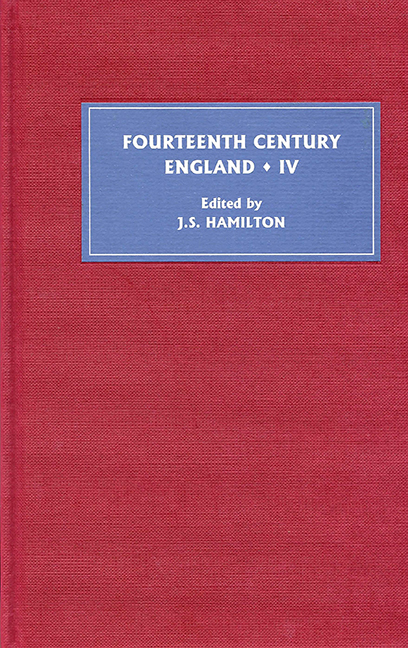Book contents
- Frontmatter
- Contents
- List of Illustrations
- Contributors
- Preface
- Abbreviations
- Who was St Thomas of Lancaster? New Manuscript Evidence
- ‘Hedging, Ditching and Other Improper Occupations’: Royal Landscapes and their Meaning under Edward II and Edward III
- Paying for the Wedding: Edward III as Fundraiser, 1332–3
- The Politics of Privilege: Thomas Hatfield and the Palatinate of Durham, 1345–81
- Agnes Maltravers (d. 1375) and her Husband John (d. 1364): Rebel Wives, Separate Lives, and Conjugal Visits in Later Medieval England
- Gendering Pastoral Care: John Mirk and his Instructions for Parish Priests
- Prosecution of the Statutes of Provisors and Premunire in the King's Bench, 1377–1394
- ‘Mercy and Truth Preserve the King’: Richard II's Use of the Royal Pardon in 1397 and 1398
- Aliens in the Pardons of Richard II
- ‘Too Flattering Sweet to be Substantial’? The Last Months of Thomas, Lord Despenser
- ‘O Prince, Desyre to be Honourable’: The Deposition of Richard II and Mirrors for Princes
- Regional Politics, Landed Society and the Coal Industry in North-East England, 1350–1430
Aliens in the Pardons of Richard II
Published online by Cambridge University Press: 12 September 2017
- Frontmatter
- Contents
- List of Illustrations
- Contributors
- Preface
- Abbreviations
- Who was St Thomas of Lancaster? New Manuscript Evidence
- ‘Hedging, Ditching and Other Improper Occupations’: Royal Landscapes and their Meaning under Edward II and Edward III
- Paying for the Wedding: Edward III as Fundraiser, 1332–3
- The Politics of Privilege: Thomas Hatfield and the Palatinate of Durham, 1345–81
- Agnes Maltravers (d. 1375) and her Husband John (d. 1364): Rebel Wives, Separate Lives, and Conjugal Visits in Later Medieval England
- Gendering Pastoral Care: John Mirk and his Instructions for Parish Priests
- Prosecution of the Statutes of Provisors and Premunire in the King's Bench, 1377–1394
- ‘Mercy and Truth Preserve the King’: Richard II's Use of the Royal Pardon in 1397 and 1398
- Aliens in the Pardons of Richard II
- ‘Too Flattering Sweet to be Substantial’? The Last Months of Thomas, Lord Despenser
- ‘O Prince, Desyre to be Honourable’: The Deposition of Richard II and Mirrors for Princes
- Regional Politics, Landed Society and the Coal Industry in North-East England, 1350–1430
Summary
R. R. Davies, in his 1994 presidential address to the Royal History Society, began by saying that ‘Peoples are back on the historian's agenda’. In his 1996 address, however, he went on to say that ‘a people … is a most evanescent and elusive concept; it lacks fixed form and geographical definition. This is precisely where law could be helpful: it helped establish the identity of a people in its own eyes and those of others.’ Davies here was thinking primarily of the claim of a people to possess a unique body of law and custom as an identifying characteristic, but it is also true that the way a people's legal system dealt with those who might be defined as aliens, as non-members of that people yet at least temporarily amenable to that system of law, can be studied as a useful means of gaining insight into how a people reacted to the strangers in their midst. These reactions are often seen as negative. Anthony Goodman vividly expressed this view in summing up English attitudes at the end of the Middle Ages: ‘An English sense of racial superiority is reflected in denigration of England's neighbors. For the Welsh, restricted by statutes enacted in reaction of Glyn Dwr's rebellion’ (and before), ‘for the Gaelic Irish, stigmatized as barbarous, for the Anglo-Irish, accused of degeneracy, and for the Scots, some regarded as savage and others as generally inferior and faithless simulacra of the English, the rise of English national sentiment strengthened their own varied senses of nationality’. Similar attitudes of mutual hostility have also been seen between the English and their other neighbors, particularly, of course, the French with whom they were so long at war in this era. Even Queen Anne's Bohemian entourage was resented; it was said they ‘fed off the fat of the land, forgetful of their own country, and though only guests, they were shamelessly and grimly unwilling to return home’ until they were compelled to do so. But although these prejudices were manifested in certain aspects of the legal system of the time, by no means all encounters between the English and those they defined as alien to varying degrees were so uniformly hostile, as can be seen by studying the references to aliens in the pardons of Richard II.
- Type
- Chapter
- Information
- Fourteenth Century England IV , pp. 136 - 145Publisher: Boydell & BrewerPrint publication year: 2006

